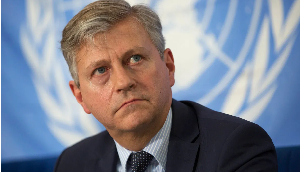There has been a sharp increase in guineaworm cases in some parts of the country as a result of poverty and under-development in those areas.
At the moment, there are more than 3,000 cases of the disease in the country.
Four hundred and nine new cases were recorded between January and June, this year, compared to 208 cases recorded during the same period last year.
The Deputy Minister of Health, Mr Moses Dani Baah, announced this at the mid-year review meeting of the Ghana Guineaworm Eradication Programme in Tamale yesterday. The theme for the two day meeting was: “A call to Commitment and Action.”
At the end of the meeting, the participants who were drawn from health institutions, district assemblies, NGOs and other stakeholders, will sign a declaration of commitment to provide effective leadership and action to eliminate the guineaworm disease from their respective areas.
The minister challenged the participants to ensure that the disease is eliminated from the country by 2004.
Mr Dani Baah called on district assemblies to allocate 50 per cent of their share of the common fund for 2003 towards the provision of potable water in their communities to enable the nation to achieve the target. He equally entreated the Ministries of Works and Housing and Local Government and Rural Development to join in this collaborative effort to fight the disease. According to the minister, the task will be made easier if all endemic villages are provided with clean, drinking water.
The National Director of the Guineaworm Eradication Programme, Dr Korkor Seidu, said when the programme began about a decade ago, there were 180,000 recorded cases of guineaworm in the country.
He said five years later, the prevalence of the disease reduced to less than 10,000 cases, adding that “since then, the programme has suffered a number of setbacks, resulting in the current situation”.
The director mentioned inactive surveillance, slow response and follow up, poor community participation and lack of effective inter-sectoral collaboration as some of the difficulties that the programme has suffered. The Yikpan-dana of Sagnarigu, Alhaji Basit Fuseini, who chaired the function, called for the intensification of education on the disease at the community level and in schools.
General News of Saturday, 17 August 2002
Source: .












